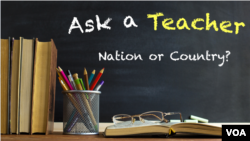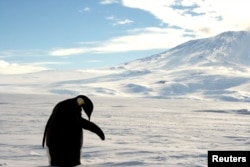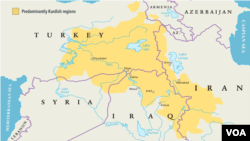Hello! This week on Ask a Teacher, we will answer a question about the difference between “nation” and “country.”
Question
Hi VOA Learning English,
Could you please help and explain what the difference is in usage between “nation” and “country?”
Thanks and regards,
Siyang Hao
Answer
Hello Siyang!
This is a great question. Often these words are used as synonyms, but there are differences. Let’s look at how we use these words and find some examples to help us understand.
Let’s start with “country.”
A “country” is an organized political unit. We often describe “countries” as “states,” especially when talking about politics. Joshua Keating, a former editor for the website Foreign Policy says there are several things that are needed to become a country.
A country needs territory or land. Next, people living there must live there permanently. Then the international community must recognize the boundaries or borders of the country.
Next, the country must have full sovereignty or the freedom of rule and be recognized by other countries. Finally, a country is ruled by a government or political body.
Here are some examples of how to use “country” in a sentence.
There are no countries in Antarctica, but some countries like Chile and New Zealand have claimed areas of it.
I have been to several countries in Europe including Romania, Czechia, Estonia and Finland.
Even though The United States is made up of smaller units called “states,” they are not sovereign countries and are not internationally recognized as such.
California is a state and has the world’s 4th largest economy, but it is not a country.
We often use “country” and “state” as synonyms, especially to differentiate the other meaning of “country” as a place outside of a city that has fields, farmland, trees, or villages.
Regina enjoys going to the country on the weekends to visit her family’s farm in West Virginia.
And now let’s move onto “nation.”
“Nation” has two different meanings. Firstly, a “nation” can describe the same thing as the word “country” or “state.” Our VOA Word Book describes a “nation” as a “country” together with its political and social systems. Let’s look at an example.
There are 193 nations that make up the international organization called The United Nations.
The nation of Argentina recently won the FIFA World Cup.
“Nation” also has another meaning. It is the people of an area who are connected by a common culture or identity.
Sometimes a “country” or “state” is represented by one “nation,” called a “nation-state.”
Japan, Finland, and even the United States are considered nation-states.
Not all “nations” of people have their own “country” or border of their land that is recognized internationally.
Examples of “nations” of people without their own “country” include: The Kurdish people and native or indigenous people like Native Americans.
The Kurdish nation lives throughout a region called Kurdistan, which is spread throughout five countries. Kurds have a common language and culture.
First Nations people are an indigenous nation group in Canada.
Please let us know if these explanations and examples have helped you!
What question do you have about American English? Send us an email at learningenglish@voanews.com
And that’s Ask a Teacher.
I’m Faith Pirlo.
Faith Pirlo wrote this lesson for VOA Learning English.
______________________________________________________________
Words in This Story
synonyms – n. a word that is similar in meaning to another word
sovereignty – n. a country’s independent power and the right to govern itself
evolution – n. a gradual process of change and development
indigenous – adj. produced, living or existing in a certain place or environment; native to a place
__________________________________________________________
Do you have a question for the teacher? We want to hear from you. We have a new comment system. Here is how it works:
- Write your comment in the box.
- Under the box, you can see four images for social media accounts. They are for Disqus, Facebook, Twitter and Google.
- Click on one image and a box appears. Enter the login for your social media account. Or you may create one on the Disqus system. It is the blue circle with “D” on it. It is free.
Each time you return to comment on the Learning English site, you can use your account and see your comments and replies to them. Our comment policy is here.









Forum